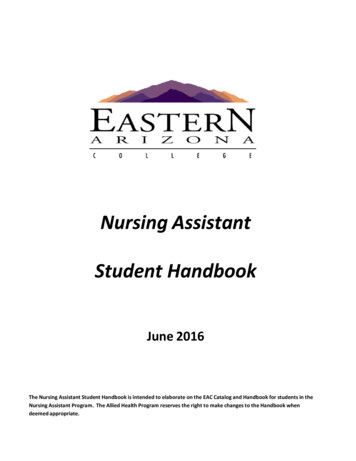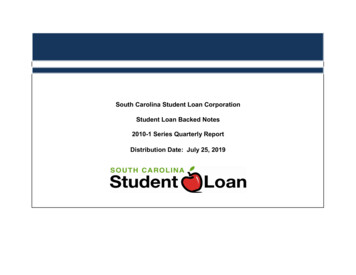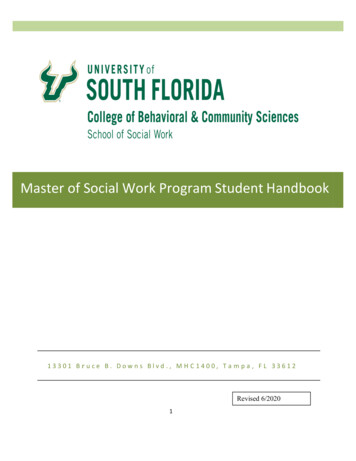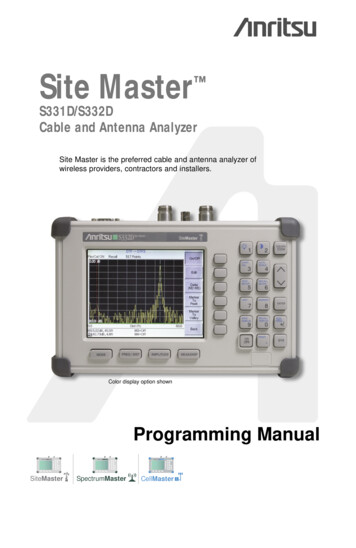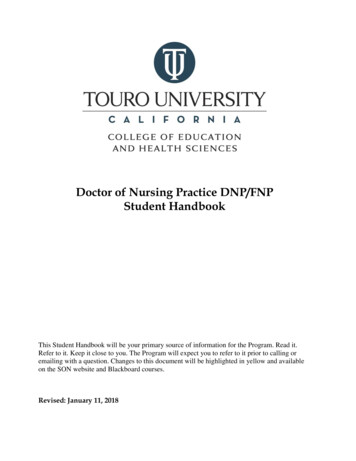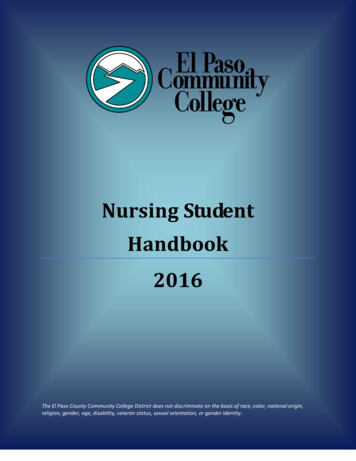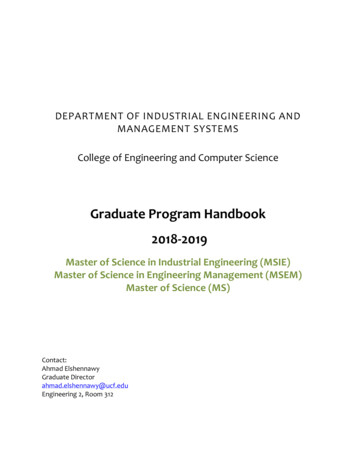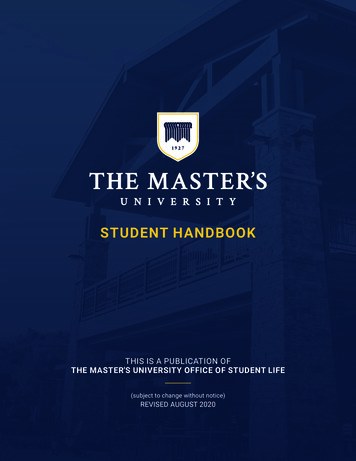
Transcription
STUDENT HANDBOOKTHIS IS A PUBLICATION OFTHE MASTER'S UNIVERSITY OFFICE OF STUDENT LIFE(subject to change without notice)REVISED AUGUST 2020
Welcome from the Office of Student LifeThe Master’s University is a remarkable place. It is a place that celebrates the Lordship of Christ and thesufficiency of His Word to address every academic discipline and detail of life. It is a place where studentscan grow spiritually in a comprehensive way and avoid fabricated standards of maturity that are rootedin either legalism or license. At Master’s, students are shaped by an exclusively biblical worldview, whichtransforms them in order to advance the Truth, combat error, and promote wisdom. It endeavors to be adistinctively Christian University and make a lasting contribution to the Kingdom of God worldwide. This isnot a sinless place, but one where the students themselves shape a culture committed to seeing everyonebecome more like the Master. On behalf of the faculty, staff, and administration, we invite you to join us andparticipate in what God is doing here and belong to something truly remarkable.
TABLE OF CONTENTSContact InformationDepartmental Contact List13A Brief History ofThe Master's University4Student Life Philosophy5The Distinctives of Biblical LivingDivine AuthorityHeart TransformationSanctifying RelationshipsGospel WitnessCommunity CovenantStudent Life ProgramsStudent Life ProgramsASB ProgramsThe Associated Student Body (ASB)Campus EventsStudent ClubsIntramurals and RecreationChapel ProgramsChapelThe Truth & Life ConferenceDay of PrayerOutreach ProgramsGlobal Outreach TeamsEngageMissionaries in Residence (MIR)International Student AdvancementResidence Life ProgramsDeansOn-Campus StaffResident Directors (RDs)Resident Assistants (RAs)Wing Assistants (WAs)Off-Campus StaffLocal 41414141415Student Standard of ConductBiblical MandatesExamples of Walking in the SpiritLoving One AnotherSubmission to AuthorityStewardshipModestyExamples of Walking in the FleshAngerJealousyDeceptionUnwholesome SpeechStealingLustSexual ImmoralitySubstance AbuseUniversity PoliciesGeneral ProhibitionsPornographyWeaponsGamblingGeneral PoliciesDrugs and AlcoholDancingMinors on CampusOnline ClassesUse of Electronic MediaSocial Media PolicyFeedbackAppearance and Dress CodeDaily DressClass and Chapel DressRecreational DressFormal DressChurch Involvement and AttendanceChurch InvolvementChurch AttendanceChapel Etiquette and AttendanceChapel EtiquetteChapel AttendanceChapel ExemptionThe Truth & Life g Assignment PoliciesOn-Campus ResidenceRoom Assignmentsand Housing RequestsOff-Campus HousingResidence Hall PoliciesGeneral Residence HallGuidelines and ProceduresResidence Hall Specific RulesResidence Hall / Wing MeetingsQuiet HoursResidence Hall ActivitiesLoungesSign-In / Sign-Out PoliciesLaundry FacilitiesWater and Water BalloonsRoom and Car SecurityBicyclesPets and AnimalsEarthquake and Fire ProcedureTransportationResidence Hall Room PoliciesBedding and LinensKitchen EquipmentFire Code RegulationsRoom Care and Room ChecksRoom Check-Out at Mid-SemesterRoom Check-Out at End of a SemesterTelevisionProjectorsRoom KeysEntering Students’ RoomsGuests and VisitorsGuestsStudents Visiting From AnotherResidence Hall or Off-Campus StudentsMembers of the Opposite SexSolicitationFood ServiceBreak Housing and Early ArrivalBreak Housing PolicyEarly Arrival ProcedureClosed Campus PolicyUnsanctioned 2626272727272727282828282828292929303030Legal ConsiderationsStatement on SubmissionDiscrimination Policies and GrievancesGeneral StatementGrievance ProcedureHealth and SafetyHIV and AidsHealth GuidelinesCompliance with Local, State,and Federal LawsSexual MisconductMedia Ethics Polic StatementHazing / Initiation ActivitiesPranksCalifornia Fire CodeNotice of Nondiscrimination &Affirmation of The Master's UniversityCommitment to ScriptureCalifornia Legislative InformationStudent CareSuicideCounselingClassroom ContentMissing Student PolicyMissing Student ProceduresStudent Consumer InformationDisciplinary SystemRequired CounselingReprimandWork DetailsAssignmentsFinesChurch / Chapel ProbationStudent ProbationAcademic ProbationSocial Suspension (On-Campus)Social Suspension (Off-Campus)Full SuspensionReapplication StatusDismissalAcademic DishonestyTranscript 383940404040414141414141414142424243
Student HandbookCONTACT INFORMATIONStudent Conduct CouncilStudent Appeals CommitteeAppeal Committee for Sexual MisconductArbitrationAppendicesAppendix 1:Discernment in Christian LibertyAppendix 2:RestorationAppendix 3:Statement on Life, Marriage, and SexualityAppendix 4:Drug and Alcohol Abuse Prevention PolicyAppendix 5:Sexual Harassment Policy and PreventionAppendix 6:Campus Safety Campus Codes43434444The Master’s University WebsiteFor the most current information regarding The Master’s University, please access our website atwww.masters.edu.45455255576182Written CorrespondenceWhen corresponding with a particular individual or department, please address correspondence as follows:Individual’s and/or Department’s NameBox Number #The Master’s University21726 Placerita Canyon RoadSanta Clarita, CA 91321-1200Email CorrespondenceWhen emailing students, the convention is last name followed by first initial and middle initial @masters.edu.For example, if the student’s name is Jane Rachel Doe, her email address will be doejr@masters.edu.When emailing a faculty or staff member, our standard email address is the first initial of the first namefollowed by full last name @masters.edu. For example, John Doe could be emailed using the followingaddress: jdoe@masters.edu.Because of duplicates, there are some exceptions. Student, faculty, and staff email addresses can beverified by emailing postmaster@masters.edu.Telephone CorrespondenceWe welcome every opportunity to speak with you personally. Always feel free to call us: 661.259.3540.You may request an individual and/or department by name or by extension number. You may also leavemessages before or after regular office hours using our automated voice messaging system from a touchtone phone.(In an effort to maintain students’ privacy in harmony with Federal Laws, none of the offices are permitted togive out students’ contact information to any party requesting such information.)Student Handbook RevisionsStudents, faculty, and staff are notified of revisions to the Student Handbook through campus email. Thecurrent edition of the Student Handbook is accessible online at www.masters.edu/handbook.1
2Student HandbookTHE MASTER’S UNIVERSITY STUDENT LIFEAcademic ProgramsThe Master’s University has several graduate and non-traditional (DCP and Online) academic programs withadditional student handbooks that describe particular responsibilities for participating students. All studentsshall abide by this Student Handbook unless specific exemptions are provided by the auxiliary academicprogram handbooks.Student Communication ExpectationsStudents are assigned a campus mailbox and email. The student is expected to regularly check and is heldaccountable for all incoming institutional communication distributed therein.DEPARTMENTAL CONTACT LISTDEPARTMENT NAMEEMAILEXT.Academic AffairsAdmissionsAlumni RelationsASBAthleticsBiblical CounselingBiblical StudiesBiological & Physical SciencesBookstoreBusiness AdministrationCampus SafetyCareer ServicesCommunicationsComputer & Information SciencesComputer Services / HelpdeskDevelopmentEnglishFinancial AidFood ServiceHealth CenterHuman ResourcesIBEXInternational StudentsLibraryMABCMABSMusicNewsletterNurseOffice of Disability ServicesPlant OperationsPresident’s OfficeRegistrarStudent EmploymentStudent Finance CenterStudent LifeTeacher EducationTranscriptsWeb 289223528123
4Student HandbookTHE MASTER’S UNIVERSITY STUDENT LIFEA BRIEF HISTORY OF THE MASTER’S UNIVERSITYSTUDENT LIFE PHILOSOPHYThe Master’s University originated as Los Angeles Baptist Theological Seminary in 1927 in the vision of Dr.William A. Mathews. He felt that there should be a Baptist seminary on the West Coast that would be trueto the whole Bible and to the Lord Jesus Christ–one that would emphasize the consecrated and Spirit-filledlife, and would have a passion for lost people all over the world. He communicated his feelings to Dr. W. F.Farr and Dr. B.F. Fellman. After prayerful consideration, these men felt led to proceed with the organizationof such a seminary. In sincere dependence upon God, the new seminary was launched in September 1927.Men and women came to study the Bible at LABTS to prepare for service in the church, at home and aroundthe world.The Distinctives of Biblical LivingIn 1946, under the leadership of President Dr. H. C. Theisen, the seminary developed into a graduateprogram and launched an undergraduate school for the purpose of offering a Bachelor of Arts degree.This step marked the launch of Los Angeles Baptist College as an undergraduate school and was thefirst step in the College and seminary becoming separate institutions (the seminary would eventuallyrelocate in 1974 to Tacoma Washington, and become known as Northwest Baptist Seminary). In August1959, Dr. John R. Dunkin became the president of the seminary and by the spring of 1961, the schoolhad moved from its original location in downtown Los Angeles to Placerita Canyon in Newhall, California.The seminary program eventually separated from the undergraduate program in 1974 and relocated toTacoma, Washington as Northwest Baptist Seminary. The remaining undergraduate program receivedits initial regional accreditation from the Western Association of Schools and Colleges in the spring of1975. Under the canopy of Dr. Dunkin’s leadership, the school enjoyed a season of unprecedented growthand establishment of a residential program. It was during this time, that many of the most recognizablebuildings on campus were established, including Rutherford Hall, King Hall, Vider Hall, Powell Library,Hotchkiss Dormitory, and Bross Gymnasium.In 1985, John MacArthur became the University’s eighth president. His commitment to the sufficiency ofScripture, the Lordship of Jesus Christ, promotion of a distinctive Christian life, and the global advancementof the gospel made him the perfect fit. The institution changed its name to The Master’s College so it couldbetter communicate the meaning and purpose of the education it was committed to provide. The Master’sCollege transitioned to The Master’s University in August 2016. Under the leadership of Dr. MacArthur, theUniversity has reestablished the residential program and expanded the undergraduate program to include13 fields of study encompassing 60 distinct emphasis areas, including a growing online program. At thegraduate level, the University offers a fifth year California Single Subject and Multiple Subject Credential,Master of Arts in Biblical Studies, Master of Education, Master of Arts in Biblical Counseling, and Masterof Business Administration. In 2019, John MacArthur transitioned to the role of Chancellor Emeritus andJohn Stead was named Interim President, having served the University for 49 years as a professor andadministrator. In 2020, following an extensive nationwide search, Sam Horn was named to the role ofPresident.This commitment to educate tomorrow’s Christian leaders began more than ninety years ago. Today, TheMaster’s University continues to train those who desire to serve in the pulpit or on the mission field as wellas those who desire to influence commerce, industry sciences, and the arts for Christ’s sake. The story ofThe Master’s University is on-going, and the pages of history are being written today in and through the livesof the students, faculty, and staff. The University will continue to expand andprogress to meet the challenges of a modern world, but it will never abandon our foundational commitmentto build a school that truly honors The Master.22 “A Brief History” has been adapted from LABTS, LABC, and Master’s historical documents. For more information and to view adisplay of institutional artifacts, please visit the Legacy Room in Rutherford Hall at 21726 Placerita Canyon Road Newhall, Ca. 91321.At Master’s we believe in the education of the whole student. This takes place inside and outside theclassroom. We want to educate the heart as well as the mind. As a complement to the work of the faculty,the Residence Life Department exists to facilitate the education of the heart outside of the classroom.We desire to maintain an atmosphere that will be conducive to the development of spiritual maturity anddiscernment. Because each student who comes to The Master’s University professes faith in Jesus Christ,we expect students to grow in that faith through the work of the Holy Spirit. We believe that our commitmentto foundational distinctives found in God’s Word helps us minister to students as they grow to be more likethe Master.The undergraduate experience encompasses the whole person, developing biblical wisdom that is appliedto every academic discipline and detail of life. Christian higher education far exceeds the acquisition ofintellectual knowledge. A distinctive Christian higher education promotes comprehensive Christian lifewithin a believing community to harmonize what a student is learning inside the classroom to what thestudent lives outside the classroom.The Master’s University emphasizes four fundamental biblical principles that promote a student’scomprehensive spiritual development. These distinctives flow out of the University’s mission statement andinfluence all our strategies and programs. The distinctives are not an exhaustive list of dynamics relating tothe Christian life, rather they are select, interrelated principles, which compose the essential philosophy ofhow The Master’s University encourages students to live and develop distinctively biblical lives during theirUniversity years and beyond. These distinctives are: Divine AuthorityHeart TransformationSanctifying RelationshipsGospel WitnessThese distinctives are individually defined by several interrelated biblical principles. The collective result isa framework for developing a distinctively Christian life. A review of these biblical truths will inform how thepolicies and procedures of Residence Life are shaped.5
6Student HandbookTHE MASTER’S UNIVERSITY CAREER SERVICES SUFFICIENT WORD: Scripture is the Word of God to man and is sufficient to address everythingpertaining to life and godliness without error or equal. It stands as the authoritative standard by whichtruth and error are both revealed and understood. Scripture alone is the authoritative revelation by whicha distinctive Christian life is guided. (Psalm 19:7-14; II Timothy 3:16-17; II Peter 1:3-11)Questions for Reflection:How does the sufficiency of Scripture shape your decision making on a daily basis?How do the scriptures relate to being discerning and wise?Are you governed increasingly by God’s Word? SUBMISSIVE DEPENDENCY: Development of the whole student in community is a supernaturalexperience in the human condition. The Christian life is exclusively dependent upon the empoweringgrace of God to realize the submissive obedience required by divine authority. (Numbers 11:16-30; John14:16-17; Galatians 2:20-21; Titus 2:11-14)Questions for Reflection:What are some practical ways that you can depend upon the grace of God while striving for lovingobedience to His Word?What does your prayer life look like?How do you cultivate a life that is “walking in the Spirit”?HEART TRANSFORMATIONA superficial change in external behavior is not the authenticating mark of a distinctively biblical life. TheMaster’s University desires to see genuine change in the student’s life that is sustainably rooted in thetransformation of his or her intellect, affections, and resolve. By focusing on what the Bible describes as theheart, we can confidently exhort and encourage a student’s comprehensive development without revertingto legalistic methodologies. The distinctive of HEART TRANSFORMATION is defined by the interrelatedbiblical principles of the MOTIVATION OF LOVE, a POSTURE OF REPENTANCE, and a LIFESTYLE OFWORSHIP. MOTIVATION OF LOVE: There is a direct connection between a heart of love and the distinctive Christianlife. Love is the greatest commandment and the foundational heart motivation by which believers cancomprehend and experience all that is revealed in Scripture. (Matthew 22:34-40; I Corinthians 13:1-3; IJohn 4:7-21)DIVINE AUTHORITYEvery expression and pursuit of the Christian life (renewing of the mind, prayer, worship, sanctification,evangelism, etc.) is empowered and experienced from Him, to Him, and through Him. We view spiritualdevelopment under the direct oversight of Divine authority. The distinctive of DIVINE AUTHORITY is definedby the interrelated biblical principles of SOVEREIGN LORDSHIP, SUFFICIENT WORD, and SUBMISSIVEDEPENDANCY. SOVEREIGN LORDSHIP: Christ is sovereign Lord over all creation and reigns as the authoritative headof the church. As the mediator of the New Covenant, His comprehensive rule is the powerful authorityby which a distinctive Christian life is experienced and directed. (Job 42:2; Romans 11:36; 14:7-12;Ephesians 1:16-23; Romans 13:1-2)Questions for Reflection:What does it truly mean to submit to the Lordship of Christ on a daily basis?Reflect upon who you are most accountable to and relate that to your accountability to God. Is Christthe ultimate authority in your life?Questions for Reflection:What does it mean to love someone as defined in Scripture?What would encourage your loving pursuit of God and others?What are some practical ways you can flee from the sin of partiality? POSTURE OF REPENTANCE: Though our hearts are transformed at the moment of regeneration,the believer continues to grow in godliness through the process of progressive sanctification. Thesanctification process includes a posture of repentance—turning away from sinful desires and actionsand refocusing our affections on the one true God. The fruit of sanctification is seen in visible acts ofobedience that flow from a heart that loves the Lord. (Psalm 51; II Corinthians 7:9-11; I John 1:9-2:6)Questions for Reflection:Do you grieve over your sin? Are you quick to repent?Would you characterize yourself as a teachable person?How you can cultivate a posture of repentance in your life?7
8THE MASTER’S UNIVERSITY STUDENT LIFE LIFESTYLE OF WORSHIP: Our priorities and actions flow out of a heart of worship. Within the fellowshipof believers, spiritual development is realized as the hearts of the people unite in worshiping the trueGod over counterfeit ones. This commitment views everything in life as an opportunity to glorify the Lordand find satisfaction in Him. (Deuteronomy 6:5; I Corinthians 10:31; John 4:21-24)Questions for Reflection:Where do acts of worship begin?Everything we do either worships God or something that is not God; what keeps your heart awareand active in pursuing all things as an act of worship that is pleasing to God?What would you say to someone who believed that worship was only for local church services?SANCTIFYING RELATIONSHIPSRelationships are the context by which a student’s distinctively biblical life is cultivated and experienced.We reject hyper-individualism and promote a sanctified pursuit of friendships that are committed tomortifying sin while seeking personal holiness in everyday life. The distinctive of RELATIONSHIPS is definedby the interrelated biblical principles of BELONGING TOGETHER, INTER- PERSONAL DISCIPLESHIP, andRESTORATION. BELONGING TOGETHER: A distinctive Christian life is not lived in independent isolation. The peopleof God are characterized by their relational interconnectedness in spirit and life. Comprehensivestudent development that is distinctively biblical occurs within the context of relationships committedto experiencing the realities of the Christian life to the glory of God. (Genesis 1:27; I Corinthians 12;Hebrews 10:19-25; Ephesians 2:14-21)Student HandbookGOSPEL WITNESSA distinctively biblical life has the primary purpose of reflecting and magnifying the redemptive work ofChrist to the world. It is the responsibility of every believer to steward the truth of the Gospel in both wordand deed. This commitment postures every student to proclaim the Truth to their generation within thecontext of God’s unfolding plan of redemption. The distinctive of WITNESS is defined by the interrelatedbiblical principles of SERVANTHOOD, LOCAL CHURCH, and GLOBAL MISSION. SERVANTHOOD: A distinctive Christian life moves sanctifying relationships beyond a right understandingof the gospel to good works of righteousness. A life committed to servanthood gives witness to the worldthe implications of the gospel in action. (Matthew 20:26-28; John 13:14-16; I Peter 4:10-11; Ephesians2:10)Questions for Reflection:What are some practical ways that you can serve those around you for the sake of the gospel every day?What motivates your heart to serve others?How does Servanthood relate to leadership? LOCAL CHURCH: The church stands as the institution that the Lord has assigned to advance and givewitness to the glories of the Gospel. The local church is the regional manifestation of the people of Godand is to be cultivated and protected. (Matthew 16:18; Acts 2:37-47; I Timothy 3:14-15; Ephesians 1:22-23)Questions for Reflection:Are you a member of a local church in the greater Santa Clarita area?In what ways can you promote the ministry in the local church to those around you?Do you consider participation in a local church as another activity or a lifestyle?Questions for Reflection:What are some practical ways you can fight against independence and pursue knowing and beingknown by those around you?Do you need other people in your life to grow spiritually? Why or why not? In what ways are youpromoting the biblical “one-another’s” around you? GLOBAL MISSION: The Master’s University promotes a comprehensive biblical worldview developmentin a believing community to advance the greater global community of faith as an exemplary light ofredemption by which Christ would call sinful man to repentance. The mission of God is to call individualsfrom every tribe, tongue, and nation and we desire to promote that plan. (Genesis 12:1-3; Matthew 28:1820; Matthew 5:13-16) INTER-PERSONAL DISCIPLESHIP: The purpose of relationships in a believing community is to encourageone another towards Christ-likeness by the grace of God and according to His Word. This process ofmutual sanctification occurs by interpersonal pursuit of one another to advance the knowledge of Christinto everyday life. (Matthew 28:16-20; II Timothy 2:2; Titus 2:1-10; I Corinthians 11:1)Questions for Reflection:Do you share the gospel to those around you on a regular basis?In what ways can you promote global evangelism in your life as a University student in a Christian University?In what ways can you invite those around you to join in advancing the gospel globally?Questions for Reflection:Who are you going to pursue discipleship with this year?Who are you seeking to be discipled by this year?What are some practical strategies to promote discipleship in your life and the lives of those around you? RESTORATION: Relationships focused on progressing in Christ-likeness includes the exhortation tomortify sinful dispositions and actions. The journey of dealing with sin, repentance, and restorationcannot be excluded from the process of spiritual development in a believing community. (II Samuel 12:115; Proverbs 27:5-6; Matthew 18:15-20; Galatians 6:1- 5; Colossians 3:16-17)Questions for Reflection:Are you faithful to confront sin in love to those around you?What is difficult about this biblical principle, and how do those concerns relate to our responsibilityas believers to one another?What are some biblical encouragements and exhortations that help you remain faithful in this area?The distinctives become a lens that illuminates everything that happens at Master’s. There is an expectationthat our students desire to grow as Christians. We are confident that when an individual develops in theirunderstanding and commitment to the distinctives they will yield a foundational biblical framework to livea distinctively Christian life during their University years and beyond.9
Student Handbook 1110 THE MASTER’S UNIVERSITY STUDENT LIFECommunity CovenantIn accordance with the Distinctives of Biblical Living, The Master’s University invites all students who areserious about realizing their calling as a Christian to consider their responsibility to the greater Christiancommunity when making application to the University. Not only are students applying to a course of study,they are applying to join a community of dedicated Christians who live, work, and study together for God’sgreater purposes. Therefore, students of the University are asked to purposely decide to participate andcontribute to the welfare and benefit of others while at the University, both on and off campus. Those whobecome a part of The Master’s University have decided that they have as their goal to be like the Master, andthus welcome the input of other godly individuals into their lives. This commitment is distinctively biblicaland rejects the values of our culture, which promote self-interest, a demanding spirit, or a rights-basedattitude.Individual students can expect to receive the care, pursuit, encouragement, exhortation, and support providedby the administration, faculty, staff, and fellow students at The Master’s University. The leadership of theUniversity will strive to consistently apply the biblical principles of loving leadership, spiritual oversight, andpractical care modelled by Christ. A student can expect that the University community will provide avenuesfor discovering and employing their unique gifts and vocational interests. The University will offer multipleforums for fellowship, spiritual dialogue, loving counsel, and settings for personal and corporate worship.In addition, the student should expect to experience the granting of forgiveness when true repentance isdemonstrated, acceptance and care when sincerely striving for victory over sin, and practical assistancewhen facing physical needs.With these goals and purposes in mind, we call every student to join the administration, faculty, and staff touphold the Community Covenant of The Master’s University.We as the administration, faculty, and staff of The Master’s University covenant to: Serve the students of The Master’s University as a faithful stewardship to the responsibilities given byour sovereign Lord Jesus Christ. Subject everything we teach and administrate to the sufficient truth of the Word of God. Rely upon the work of the Spirit in the lives of our students to accomplish genuine spiritual growth. Emphasize the development of the heart over behavior modification to cultivate an environment wherethe whole of the curriculum develops genuine worship. Recognize a posture of repentance in a student's life when faced with the realities of their sin. Pursue all our efforts at The Master’s University out of a heart of love for God and others. Relate to each student as a new creation in Christ and joint heirs of the inheritance we share in Christ. Educate as an expression of interpersonal discipleship in our lives. Sustain an environment of accountability and corrective discipline according to the biblical model ofrestoration. Enable students to employ the instruction they receive through practical and on-going acts of godlyservice to others. Invest into the lives of our students with the goal of strengthening the local church Mobilize the community of The Master’s University to advance the gospel of Jesus Christ worldwide.As the students of The Master’s University, we covenant to: Submit to the leadership of The Master’s University as an expression of our commitment to the Lordship of Christ. Seek to relate every academic discipline and detail of life to the sufficient truth of the Word of God. Strive to walk according to the Spirit and not according to the flesh. Advance in redeeming everyday opportunities as worship to God from the heart. Pursue a contrite heart as we honestly deal with the implications of sin in our lives. Increase in our love for God and relate that to how we love others. Perceive our belonging to the community of believers at The Master’s University as an expression of thegreater membership of the body of Christ. Cultivate relationships that promote discipleship in our lives and those around us. Address sin in the lives of those around us in a spirit of gentleness and peace-making as we desire topresent every person compl
www.masters.edu. Written Correspondence Box Number # 21726 Placerita Canyon Road Santa Clarita, CA 91321-1200 Email Correspondence When emailing students, the convention is last name followed by first



